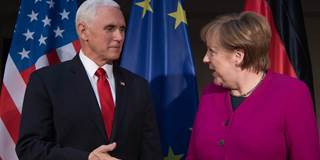Not for the first time, this year's Munich Security Conference may well be remembered as a turning point for global geopolitics. The messages coming from Europe and the United States could not have been further apart, implying dim prospects for transatlantic cooperation on managing economic and strategic threats.
MUNICH – It was at the 2007 Munich Security Conference that Russian President Vladimir Putin first signaled a cooling of Russian-Western relations. Soon thereafter, Russia invaded Georgia; and in the years since, it has annexed Crimea, launched incursions into Eastern Ukraine, and carried out cyber-attacks against Western democracies. Today, Russian-Western relations are in a downward spiral.
The annual Munich Security Conference is to geopolitics what the World Economic Forum’s meetings in Davos are to business. The gathering has evolved from its Cold War-era focus primarily on German-American military cooperation to viewing global issues through a much wider lens. Participants now discuss topics ranging from foreign policy and international security to climate change.
This year’s three-day conference, which had record-high attendance, will most likely be remembered for years to come. The speeches delivered by US Vice President Mike Pence and German Chancellor Angela Merkel could not have been more different, in terms of both style and substance. At a gathering originally designed to facilitate German-American cooperation, Germany and America’s foreign-policy positions have rarely been so far apart.

MUNICH – It was at the 2007 Munich Security Conference that Russian President Vladimir Putin first signaled a cooling of Russian-Western relations. Soon thereafter, Russia invaded Georgia; and in the years since, it has annexed Crimea, launched incursions into Eastern Ukraine, and carried out cyber-attacks against Western democracies. Today, Russian-Western relations are in a downward spiral.
The annual Munich Security Conference is to geopolitics what the World Economic Forum’s meetings in Davos are to business. The gathering has evolved from its Cold War-era focus primarily on German-American military cooperation to viewing global issues through a much wider lens. Participants now discuss topics ranging from foreign policy and international security to climate change.
This year’s three-day conference, which had record-high attendance, will most likely be remembered for years to come. The speeches delivered by US Vice President Mike Pence and German Chancellor Angela Merkel could not have been more different, in terms of both style and substance. At a gathering originally designed to facilitate German-American cooperation, Germany and America’s foreign-policy positions have rarely been so far apart.